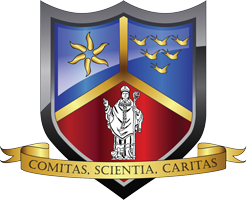Business Studies
Introduction
Business Studies can give you knowledge and skills that will help you in any future career.
You are studying the Edexcel 2017 Business Studies GCSE course.
During the Business Studies course you will look at both small business and large business giving you an idea of how to set up a business of your own and how to work in and understand a large business.
Some careers ideas that could follow from Business Studies include:
- advertising account manager, brand manager, business analyst and business adviser
- entrepreneur, estimator, administrator, human resources officer, manager and payroll clerk
- self-employment
Meet the department
- Mrs Forster-Simmons – Subject Leader of Business Studies
- Mr Campbell – Teacher of Business Studies
GCSE Business Studies Exam Results
Business Studies at St Richard’s regularly performs above the national average.
100% 9-4 in 2023 (against national results of 66.7%) with 62% of pupils achieving a 7+ (against national results of 19%).
The following topics are currently taught during Business Studies with an emphasis on starting a small business in Year 10 and looking at larger businesses in Year 11.
Paper 1
Topic 1.1 Enterprise and Entrepreneurship
In this unit pupils are introduced to the dynamic nature of business in relation to how and why business ideas come about. They also explore the impact of risk and reward on business activity and the role of entrepreneurship.
Topic 1.2 Spotting a Business Opportunity
This unit will explore how new and small businesses identify opportunities through understanding customer needs and conducting market research. They will also focus on understanding the competition.
Topic 1.3 Putting a Business Idea into Practice
This unit focuses on making a business idea happen through identifying aims and objectives and concentrating on the financial aspects.
Topic 1.4 Making the Business Effective
In this unit pupils will explore a range of factors that impact on the success of the business, including location, the marketing mix and the business plan.
Topic 1.5 Understanding External Influences on Business
In this unit pupils are introduced to a range of factors, many of which are outside of the immediate control of the business, such as stakeholders, technology, legislation and the economy. Pupils will explore how businesses respond to these influences.
Paper 2
Topic 2.1 Growing the Business
This unit looks at methods of growth and how and why business aims and objectives change as businesses evolve. The impact of globalisation and the ethical and environmental questions facing businesses are explored.
Topic 2.2 Making Marketing Decisions
Pupils will explore how each element of the marketing mix is managed and used to inform and make business decisions in a competitive marketplace.
Topic 2.3 Making Operational Decisions
This topic focuses on meeting customer needs through the design, supply, quality and sales decisions a business makes.
Topic 2.4 Making Financial Decisions
This topic will explore the tools a business has to support financial decision making, including ratio analysis and the use and limitation of a range of financial information.
Topic 2.5 Making Human Resource Decisions
Growing a business means that decisions relating to organisational structure, recruitment, training and motivation need to be made to influence business activity. These aspects are considered in this final topic.
Business Studies is taught in a range of styles where pupils will be expected to learn through theory work, group projects, pupil presentations and research.
Pupils will be assessed through two exams. Both exams are 90 minutes and will comprise of multiple choice, short and extended answer, data response and scenario-based questions with a total of 90 marks. Paper 1 will focus on the Year 10 content and paper 2 will focus on Year 11 content, both exams are taken at the end of Year 11.
The majority of homework will be completing exam style questions coupled with creating revision resources. The exam-based questions will be marked with a GCSE mark and other homework will be marked for effort.
Assessment in Business Studies
At KS4, pupils are set an aspirational target grade based on Fischer Family Trust and our own internal assessment data. Pupils are expected to achieve this grade and will be supported to do so. Past paper questions are marked according to exam board mark schemes. Pupils will take an exam style test at the end of each unit. They will also take regular multiple choice quizzes so that they can keep track of their topic knowledge and they will use smart revise to practise both multiple choice theory questions and exam style questions.
Please see our Curriculum map to see the sequence of learning.


